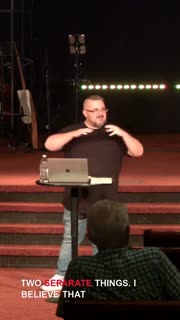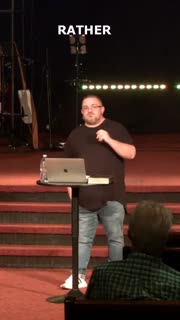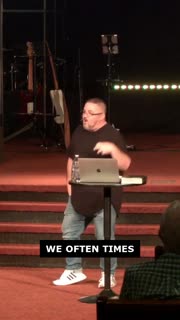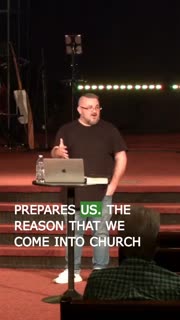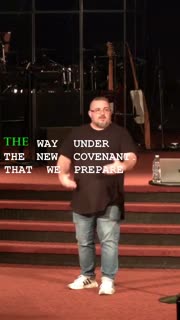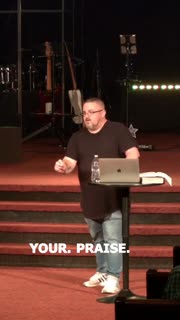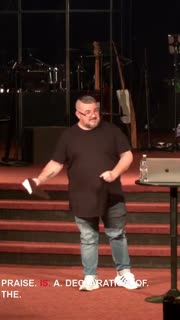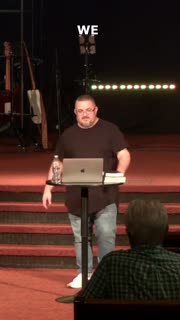Embracing Praise: Preparing Hearts for Worship
Devotional
Sermon Summary
Bible Study Guide
Sermon Clips
1. "Whenever God wants to visit a place, he always sends us. He always sends us to the people. So there are churches here because God wants to visit Sand Springs. I believe there are churches in Tulsa because God wants to visit Tulsa. I believe there are churches in OKC because God wants to visit OKC. He always sends his people where he wants to visit because his people, his church, become the hands and the feet that he uses to impact this world." [29:44] (35 seconds)
2. "I believe that there are people who think that just because they stand and sing songs on Sunday, that they have worshipped. Well, as you'll find today, singing songs is a part of worship. But it is not what worship is. And what we're finding out today is that this generation is much different than previous generations. Because in previous generations, if I were to pick up and leave Sand Springs and I were to move out west somewhere, I were to move to California or to Oregon or to Washington State. I would look for another church that was within the same denomination or organization that I was originally a part of." [37:02] (56 seconds)
3. "People would much rather go to a church that is alive but may differ on specific theological issues than to go to one where they completely align theologically, but that's dead. And so, a lot of that stuff, the thought pattern behind all of that stuff really kind of led us to do this. Now, we named it abandoned worship because growing up, I grew up in a Pentecostal denomination. And we were accustomed with what we knew as worshiping with abandon." [38:39] (45 seconds)
4. "We often times come to worship. And we want to, we have this mindset about what is proper. And what we should act like or shouldn't act like. And so on the one side we've got the folks who are, I mean, Pentecostal to the core. And they're like, yeah, wild and uncontrolled, let's do it, you know. And they're like ready to run around the building and jump over pews and do all of the excessive stuff. And then on the other side you've got the folks who go, well, the presence of God is holy. He is God. He should be revered. We should be quiet. We should be reverent." [41:07] (41 seconds)
5. "Praise prepares us. The reason that we come into church on Sunday and we enter into praise and worship is because a lot of times, and I can't speak for everybody, but maybe you've had some stuff throughout the week that's kind of clung on to you. Y'all know what I'm talking about. Like you've had some stuff that's caused some trouble, some attitudes or some discouragement to cling to you. You've had some reports that came in that you didn't particularly like. And so you walked in on Sunday and that's still clinging to you." [46:22] (45 seconds)
6. "The way under the new covenant that we prepare ourselves for the presence of God is through praise. Now, I'm going to run through this. I'm not even going to turn to it. But in Mark chapter 4 and Luke chapter 8, both of them give a story about a sower. And when Jesus starts to give this story, he says there's a sower who went out to sow. And he said some seed fell by hardened soil, by the wayside. Some fell by rocky soil or shallow soil. Some fell among the thorns or the distracted soil. And then some fell on good soil." [48:54] (51 seconds)
7. "Your praise is the plow that will break up the hardened soil of your heart to receive the seed of the word of God. And too often when, and if we would just get out of our comfort zone and praise. Praise is the plow that prepares the soil. I'm trying to, trying to, praise prepares us. Can he says praise in the dance. Psalm 150. Praise me in the dance." [57:31] (84 seconds)
8. "Praise is a declaration of the goodness of God. It is an expression of how good he has been in and to you. So why? Because it prepares me. It breaks the pride in me. It clears the soil of my heart so that my heart is ready to receive whatever God has to say." [01:02:15] (50 seconds)
9. "We praise according to God's preference, not our personality. Here's what I want you to understand today. Praise has a purpose. It's not just to sing a song. Come on. It's not just to, we used to, you know, we used to call it preliminaries back in the day, right? I mean, any y'all in the old church, you remember we call it preliminaries. That was everything prior to the sermon, right? We would have, well, we had preliminaries and we had song service, which was a preliminary to the sermon, right?" [01:22:29] (60 seconds)
10. "Praise prepares your heart so that you can step into his presence and receive what he has to say. Because here's the thing, I don't think we ever have to get to a sermon for you to hear from God. We just have to get into his presence and he is more than willing to speak to each and every one of us. And so as we gather together, as we gather in worship, as we gather in praise, I'm going to encourage you again this week, ask God to take you outside of your comfort zone." [01:24:24] (62 seconds)
Ask a question about this sermon
2. "I believe that there are people who think that just because they stand and sing songs on Sunday, that they have worshipped. Well, as you'll find today, singing songs is a part of worship. But it is not what worship is. And what we're finding out today is that this generation is much different than previous generations. Because in previous generations, if I were to pick up and leave Sand Springs and I were to move out west somewhere, I were to move to California or to Oregon or to Washington State. I would look for another church that was within the same denomination or organization that I was originally a part of." [37:02] (56 seconds)
3. "People would much rather go to a church that is alive but may differ on specific theological issues than to go to one where they completely align theologically, but that's dead. And so, a lot of that stuff, the thought pattern behind all of that stuff really kind of led us to do this. Now, we named it abandoned worship because growing up, I grew up in a Pentecostal denomination. And we were accustomed with what we knew as worshiping with abandon." [38:39] (45 seconds)
4. "We often times come to worship. And we want to, we have this mindset about what is proper. And what we should act like or shouldn't act like. And so on the one side we've got the folks who are, I mean, Pentecostal to the core. And they're like, yeah, wild and uncontrolled, let's do it, you know. And they're like ready to run around the building and jump over pews and do all of the excessive stuff. And then on the other side you've got the folks who go, well, the presence of God is holy. He is God. He should be revered. We should be quiet. We should be reverent." [41:07] (41 seconds)
5. "Praise prepares us. The reason that we come into church on Sunday and we enter into praise and worship is because a lot of times, and I can't speak for everybody, but maybe you've had some stuff throughout the week that's kind of clung on to you. Y'all know what I'm talking about. Like you've had some stuff that's caused some trouble, some attitudes or some discouragement to cling to you. You've had some reports that came in that you didn't particularly like. And so you walked in on Sunday and that's still clinging to you." [46:22] (45 seconds)
6. "The way under the new covenant that we prepare ourselves for the presence of God is through praise. Now, I'm going to run through this. I'm not even going to turn to it. But in Mark chapter 4 and Luke chapter 8, both of them give a story about a sower. And when Jesus starts to give this story, he says there's a sower who went out to sow. And he said some seed fell by hardened soil, by the wayside. Some fell by rocky soil or shallow soil. Some fell among the thorns or the distracted soil. And then some fell on good soil." [48:54] (51 seconds)
7. "Your praise is the plow that will break up the hardened soil of your heart to receive the seed of the word of God. And too often when, and if we would just get out of our comfort zone and praise. Praise is the plow that prepares the soil. I'm trying to, trying to, praise prepares us. Can he says praise in the dance. Psalm 150. Praise me in the dance." [57:31] (84 seconds)
8. "Praise is a declaration of the goodness of God. It is an expression of how good he has been in and to you. So why? Because it prepares me. It breaks the pride in me. It clears the soil of my heart so that my heart is ready to receive whatever God has to say." [01:02:15] (50 seconds)
9. "We praise according to God's preference, not our personality. Here's what I want you to understand today. Praise has a purpose. It's not just to sing a song. Come on. It's not just to, we used to, you know, we used to call it preliminaries back in the day, right? I mean, any y'all in the old church, you remember we call it preliminaries. That was everything prior to the sermon, right? We would have, well, we had preliminaries and we had song service, which was a preliminary to the sermon, right?" [01:22:29] (60 seconds)
10. "Praise prepares your heart so that you can step into his presence and receive what he has to say. Because here's the thing, I don't think we ever have to get to a sermon for you to hear from God. We just have to get into his presence and he is more than willing to speak to each and every one of us. And so as we gather together, as we gather in worship, as we gather in praise, I'm going to encourage you again this week, ask God to take you outside of your comfort zone." [01:24:24] (62 seconds)

